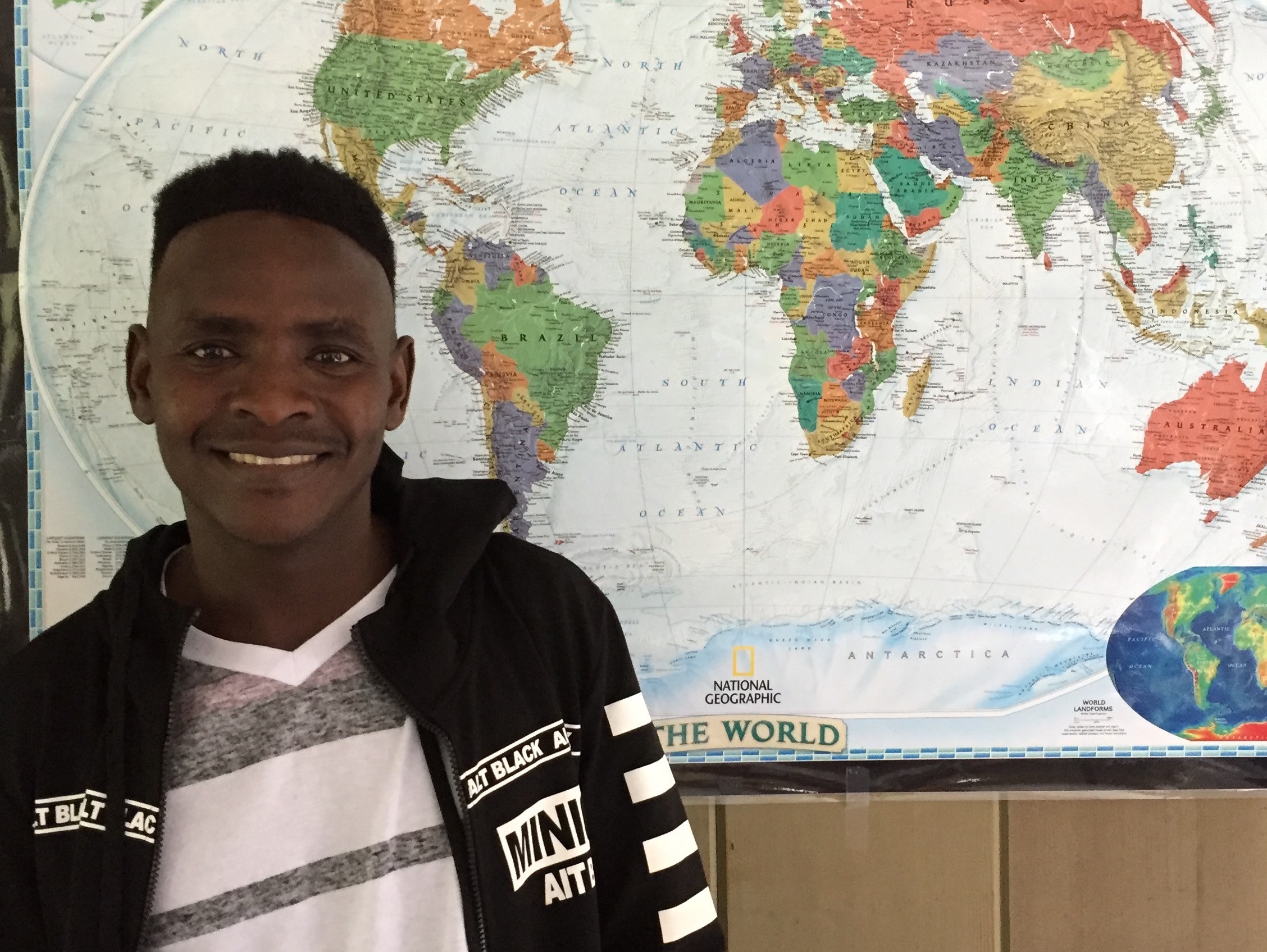A Profile by KRM Caseworker Liz hardt
The commute from Louisville to the Amazon distribution center in Jeffersonville, Indiana, can take Ayoub Musa two hours by bus if he can’t get a ride. He is no stranger to travelling great distances, however—even on foot. In 2011, he fled home and walked nearly 23 miles.
Ayoub remembers the date he left. On March 20 of that year, he departed home and walked from the city of Geneina, the capital of West Darfur, Sudan, to Adre, a town just over the border into neighboring country Chad.
“I walked because if I took a car, they would stop me at the gate,” he says of the nearly 23-mile journey. Fleeing persecution, attacks, and arbitrary arrests by the Janjaweed—a militia group operating in West Sudan—and by the Sudanese government against his Massalit tribe, Ayoub knew it was too dangerous for him in Sudan.
“The government of Sudan tried to arrest me,” he recounts. “I was working in the market Abazir, and several times the government would come arrest young people from the market. We didn’t know where they carried them. They didn’t come back again.”
The market in Geneina was not the first encounter with the militia for Ayoub and his family. He recalls Janjaweed attacks on Massalit villages and farms. Sometimes the Janjaweed were assisted by government forces.
“They would come attack us in the night—around five in the morning before we wake up—to come and burn the village,” he says. Two of Ayoub’s brothers, Dajadeen and Mustafa, were killed in their village in December 2003.
–
“Even when we moved from the village to the city,” he continues, “the government was still arresting the young people.” One day, he was warned of his impending arrest. “Before I reached the market, I met an old woman. She told me ‘Even today the government is arresting people in the market, so you have to go back to hide yourself or you can leave this country.’”
He started his journey that morning.
First, he arrived in Chad, where he had seen Sudanese police in the city of Adre and immediately changed course for another city, Abeche. Once there, he was able to get some food and a place to sleep from a stranger named Ahmad, who advised him to find a camp in another country. The stranger had said that the Chadian government often arrested Sudanese people for not having Chadian papers. Ayoub then travelled for three days to Chad’s capital city N’Djamena, then across Nigeria to the city of Lagos, and finally to Ghana, where he was able to register with the UNHCR and begin the refugee process.
Ayoub’s destination in Ghana was about 2,000 miles away—nearly the distance across the continental United States.
–
Six years later, on January 24, 2017, with 6,500 miles behind him, he stepped foot into the United States.
“I was so happy,” Ayoub says. “The United States is different from all the world. It is a very good and a very safe place. Anywhere you go, you can get a safe place.” He had a friend in Louisville, so the US refugee program placed him with KRM for resettlement.
He eagerly began building his life in Louisville, working with his KRM caseworker and attending ESL classes. He began his first job at a manufacturing facility in April 2017 and then registered for classes at Jefferson Community and Technical College. He plans to study there for a couple years and then transfer to the University of Louisville to pursue a degree in engineering.
“When I was in Sudan, my interest in being an engineer came from my friend’s uncle,” Ayoub says. “He had a place to prepare and design cars.”
“I want to live here for a long time,” he adds. “It’s a very good state. I will stay here forever, I think.”
–
With some help from Louisville’s Sudanese community, Ayoub was able to reconnect with his family. He had lost touch with them over six years ago and didn’t know where they were or if they were safe. Through local connections, he learned that his parents, sister, and brother are living in West Darfur’s Abu Zar refugee camp.
He says when his family discovered that he was in the United States, “they were very proud of me—and surprised.” Now, helping his family navigate the road to safety and resettlement in the US is a priority for him. The camp is dangerous for them, he explains.
“They can’t go outside. Sometimes [militia] come to beat people or destroy the farm,” he says. “They can’t get work to get money to eat.”
In the midst of achieving his goals here in Kentucky, Ayoub thinks often of those he met along his journey.
“I hope [Sudan] will stop fighting and stop killing and attacking people,” he says. “I wish that the government will change and that peace will come to our country, and all the people will get freedom. I hope my family will come and reach me here. I left a lot of friends in Ghana and in different countries. I wish for them to come here to the United States very soon.”
Refugees from Sudan are barred from entry into the United States for 90 days, as part of the executive order released on October 24, 2017. Refugees from ten other countries and stateless Palestinians are also unable to enter the country.
Another provision of the order indefinitely suspends a follow-to-join visa program that reunites spouses and children who were separated from each other.
Learn more about other provisions within the latest executive order and how it impacts displaced families and individuals around the globe.
